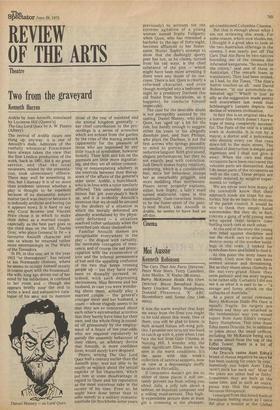REVIEW OF THE ARTS
Theatre
Two from the graveyard
Kenneth Ruffen
Ardeie by Jean Anouilh, translated by Lucien ne Hill (Queen's) The Gay Lord Quex by A. W. Pinero (Albery) The revival of Ardele clears one thing up, anyway: it is one of Anouilh's duds. Admirers of the ruefully whimsical Frenchman have always taken the view that the first London production of the work, back in 1951, did it no great service, and that the local reviewers, misled by the presentation, took unnecessary offence. There may well be something in this, but I daresay it is of no more than academic interest whether a play is thought to be repellent because of its distasteful subject matter (as it was then) or because it is tediously artificial and boring (as it appears now). It is hard to say why Coral Browne and Vincent Price chose it in which to make their debut as a married couple, especially as the best part goes to the third man on the bill, Charles Gray, who plays General St Pe — a favourite Anouilh character and one to whom he returned rather more entertainingly in The Waltz of the Toreadors.
St Pe, in this one, set in the year 1912 "or thereabouts", has retired to his Normandy chateau, where he seems to occupy himself mostly in coarse sport with the housemaid. His wife, long ago driven out of her mind by his infidelities, is confined to her room and — though she appears briefly near the end to recite a lewd and exhaustive catalogue of his sins, not to mention those of the rest of mankind and the animal kingdom generally — her chief contribution to the proceedings is a series of screeches which are echoed from the garden by the cries of the mating peacock (apparently for the pleasure of those who are impressed by any little touch of symbolism, however foolish). Their kith and kin on the premises are little more ingratiating, and they are all either committing or contemplating adultery in the intervals between their discussions of the affairs of the general's elder sister, Ardele, a hunchback, who is in love with a tutor similarly afflicted. This ostensibly suitable liaison has got everybody's back up, and it is evidently Anouilh's intention that we should be amused by the drollery of a situation in which the morally deformed are absurdly scandalised by the physically deformed — a situation resolved rather unfunnily when the wretched pair shoot themselves.
Familiar Anouilh themes are recognisable everywhere in the play — the disgust with carnality, the inevitable corruption of innocence, and of course the sad preoccupation with the evanescence of love and the infernal permanence of lust and the appalling confusion of the two that keeps crossing people up — but they have rarely been so dismally pursued, or, indeed, with such depressing obviousness. Miss Browne and her husband, in case you were wondering about them, actually play a married couple — the general's younger sister and her husband, a count — whose tragedy seems to be that they are so concerned about each other's extramarital activities that they barely have time for their own; and the whole thing is rounded off gruesomely by the employmeat of a brace of ten-year-olds, who are required repulsively to parody the unseemly behaviour of their elders, an arbitrary device that Anouilh, in more confident form, would surely have despised.
Pinero, writing The Gay Lord Quex half a century earlier than the Anouilh play, was not able to be nearly as explicit about the 'sexual exploits of his characters, which put him at some disadvantage in regard to Quex and his reputation as the most notorious rake in the society of his time. Even so, he might have done better than to refer merely to a solitary romantic interlude (in Stockholm some years previously) to account for the extreme agitation of a young woman named Sophy Fullgarny when Quex, who has remained a bachelor to the age of forty-eight, becomes affianced to her fostersister, Muriel. Sophy's attempt to show that the dashingly sporty peer has not, as he claims, turned from his old ways, is the chief substance of the plot — which might have been more arresting if there were any doubt of its outcome. There is not. Quex is clearly a reformed character, and even though inveigled into .a bedroom at night by a predatory Duchess (his old friend from Stockholm, as it happens), he conducts himself impeccably. The case for the desirable doubt is not perceptibly assisted by the casting. Daniel Massey, who plays Quex, has 'aged up' a bit for the role, but hardly enough to suggest either his years or his allegedly dissolute past; and Sian Phillips, who plays the Duchess, is not the first actress who springs plausibly to mind to portray irresistibly seductive languor. Both give sound, elegant performances, but they do not exactly peal with conviction. Judi Dench makes Sophy relatively endearing, which is a considerable feat, since her behaviour stamps her as remarkably priggish, and more meddling than mettlesome. Pinero never properly explains, either, how Sophy, a lady's maid turned manicurist, came, in this essentially class-conscious milieu, to be the foster-sister of the gently-bred Muriel. Like Anouilh in Ardele, he seems to have had an off-day.


































 Previous page
Previous page